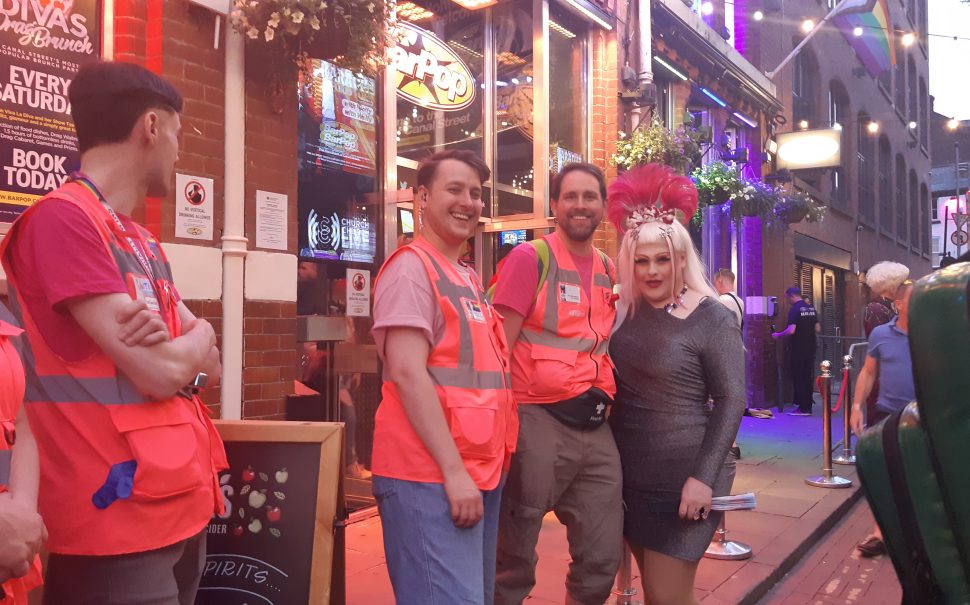Pride month is one of the busiest times of the year for Manchester’s Gay Village – the Village Angels volunteer every weekend to make sure everyone gets home safe.
At about 1am on a Friday night, people outside the bars on Canal Street started to notice that there was a man in a hospital gown sitting on the pavement near the bridge. He had no shoes on and still had part of an IV cannula in his hand.
The group of Village Angels I was with approached the man and started talking to him, asking calmly about where he’d come from and why he was there. Two Angels assessed his mental and physical state while the team lead called an ambulance, and another Angel stood nearby moving along any onlookers.
This efficient, smooth-running team effort wasn’t spontaneous, but instead something that group had practised again and again on many similar nights.
It became clear that the man needed to go back to hospital and it wasn’t safe for him to just walk there or get a taxi alone. An ambulance would have taken around 4 hours to arrive. With support from the emergency services, the Village Angels were able to contact a mobile police unit to safely drive the man back to hospital.
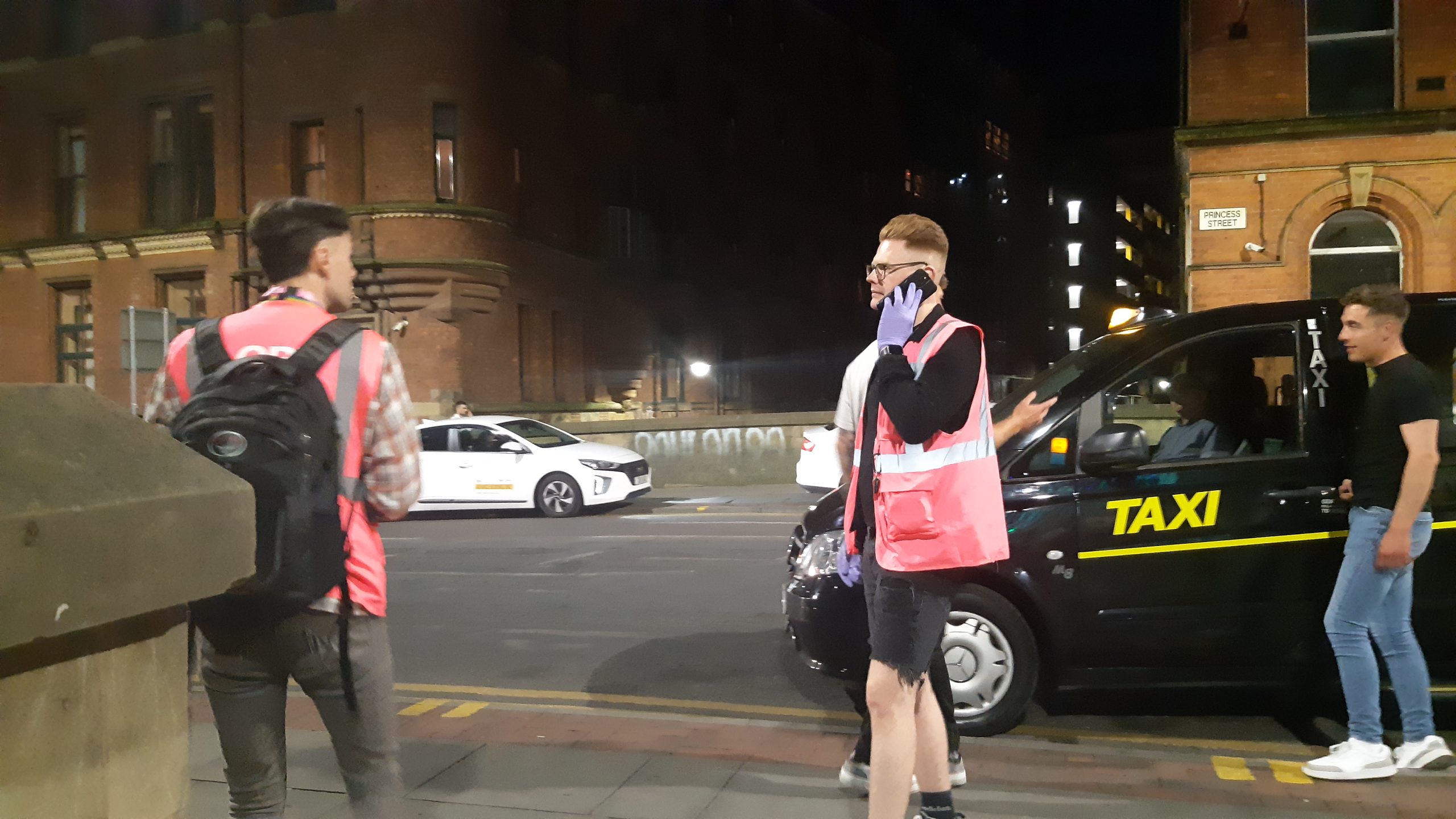
Since 2011, the Village Angels have looked after Canal Street’s partygoers every Friday and Saturday night. This volunteer program is run by the LGBT Foundation – a Manchester-based charity providing a range of services for lesbian, gay, bisexual, transgender and queer people.
The help the Angels offer includes first aid and mental health support, as well simple things like helping people charge their phones and get taxis home.
Gareth Watson, Community Safety Coordinator at the LGBT Foundation, said: “The need for the Angels comes out of the fact that the Village itself is famous – it draws people from all over the place – and, unfortunately, a chunk of the night-time crime in Manchester does happen around the Village.
“It means there’s lots of people, lots of tourists, and that causes an extra layer of vulnerability.”
In 2019 alone, the Village Angels interacted with 5,000 people out in the Gay Village, including 450 vulnerable service users, such as those facing mental health issues or substance abuse.
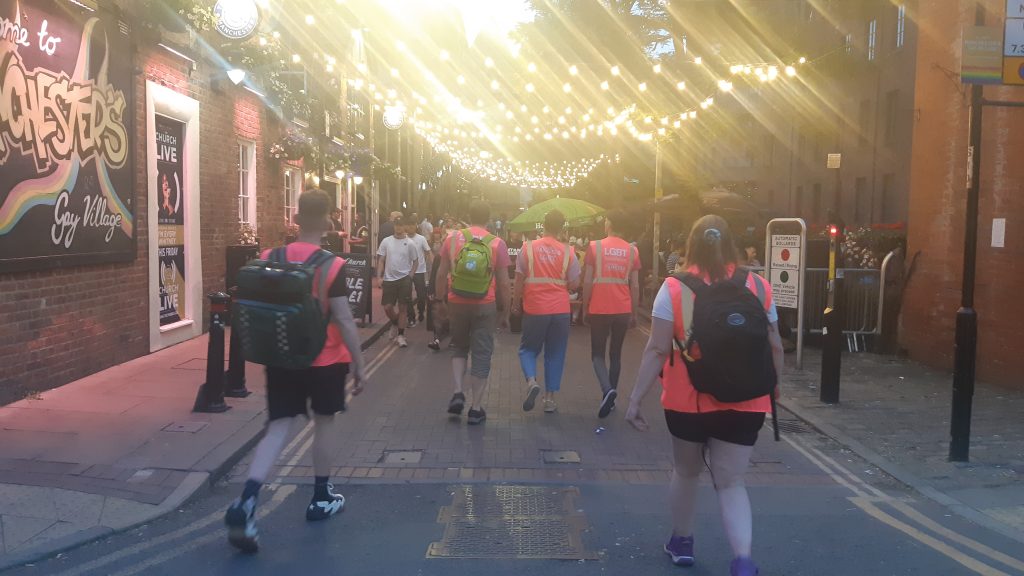
I accompanied the Village Angels on their 9pm-3am shift on Friday 16 June to understand what their work involves.
As well as being out on the streets of the Gay Village, the Angels also run the Village Haven at 45 Bloom Street, which is where I met up with the team for that night’s shift.
Gareth explained: “Monday to Friday [the Village Haven] is the charity Barnabus but they kindly let us use that space on the weekend. It’s so we have somewhere to take people back to if they need that little extra level of support.
“For example, if someone has been spiked they can have that time and space to just come round a bit.”
The Village Haven also acts as a base for the Angels to store their kit and take breaks when needed. We had a briefing there by the shift lead before heading out to the streets.
Their kit includes first aid equipment, a defibrillator, and a water safety life ring in case someone falls in the canal.
I was given one of the Angels’ pink hi-vis jackets so it was clear I was with the team, and a yellow ‘observer’ lanyard to show I was not a trained volunteer. New Village Angels wear these lanyards for their first three shifts while they’re still completing training.
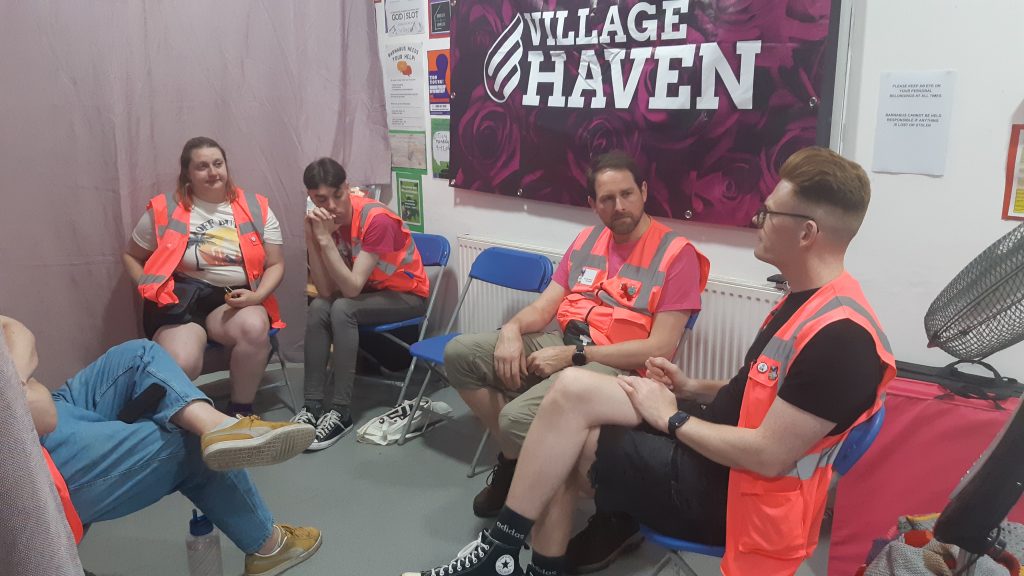
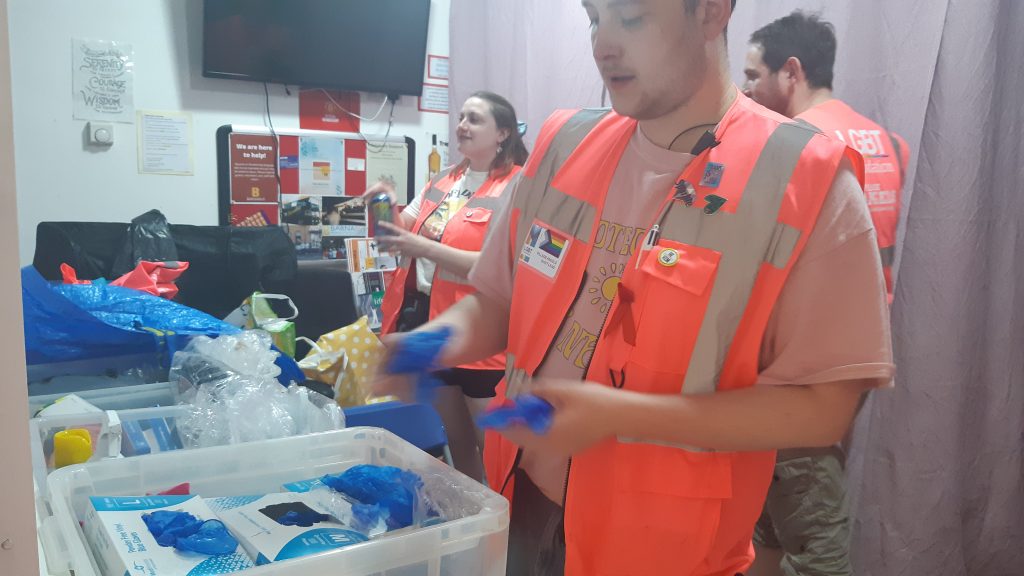
At the start of the night, I went with the Village Angels to attend a meeting with Greater Manchester Police about coordinating services across the city centre. This included a briefing about people who had been identified by the police as being at risk of harming themselves or others, and may be out in Manchester that night so both police and volunteer groups were aware of them.
These regular meetings are part of Operation Custodian – GMP’s initiative to keep the city centre, mainly bars and clubs, safe at weekends.
Joe, one of the shift leads, said: ‘We [the Angels] have a big focus on inter-agency collaboration, so we work very closely with the police and other emergency services, and with the door staff around the Village as well.
“By maintaining those strong lines of communication, we can make sure that we’re working together to best support people.”
All of the Village Angels, on-patrol police officers, and door staff carry radios so they are able to contact each other quickly as part of one safety network.
‘If we notice something that feels a bit off or something that could potentially escalate later on, the quicker that we’re able to notify the police, the sooner they can interact, and it’s less likely that someone could come to harm later in the night,” he added.
When we headed out at around 10pm, Canal Street was in full swing. A mix of people having after-work drinks, attending drag shows, doing karaoke, and meeting up for Manchester Rubber Weekend meant most of the bars were already filling up.
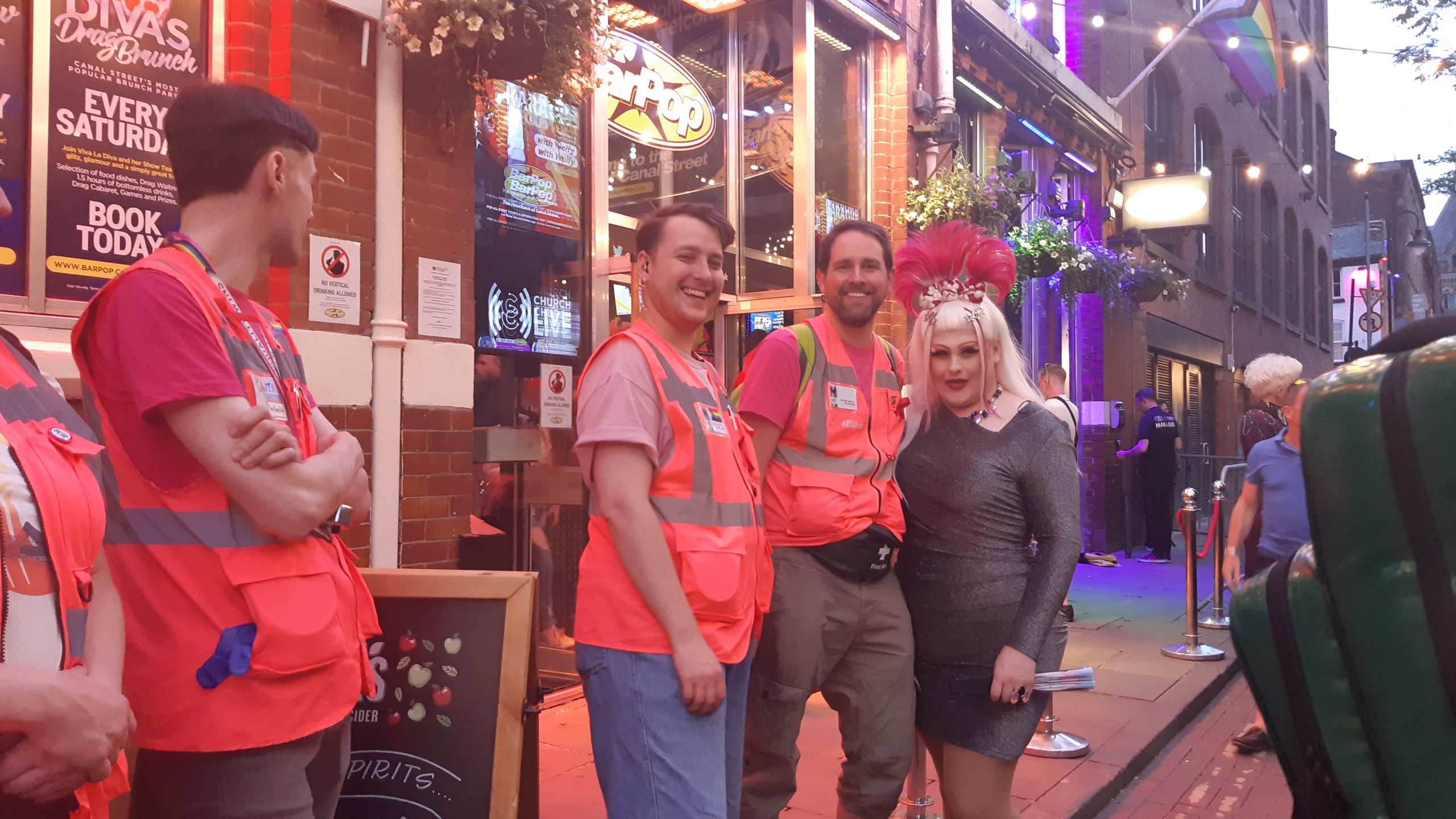
One of the Angels, Lydia, explained why she volunteers with the group: “It’s about those moments with people just having a really rough time – you’re seeing them in such a difficult situation but then at the end of the conversation you feel like you’ve provided them with a link to get some support.
“You feel like you’ve been able to talk them through a sensitive time, maybe when they’re the most vulnerable, and you were there rather than someone who might take advantage of that person.
“It’s hoping that maybe at one of their lowest points, you’ve helped or given them something to get to the next step – it’s letting them know that people do care.”
This care includes both reactive support and harm reduction to prevent future incidents.
Joe said: “As well as supporting people on shift, we’re also here to reduce risk. So if the team come across anything that could be used as a weapon, so glass or bottles, we’ll pick those up.”
The Angels are well known around the Gay Village, and several people outside the bars came up to the team to say how much they appreciated the work that the group does.
Unfortunately not all of the attention was positive – a car screeched past with men shouting that we were all “f***ing gays!”
I realised that the pink hi-vis vests we were wearing so people in need could spot us, with LGBT Foundation printed on the back, also made us a more visible target for homophobia.
Some service users come up to the Angels directly and ask for help, but most are approached by the team or flagged by bar staff.
For example on that Friday night, a girl and her girlfriend were approached by the Angels because one of them was slumped over against a wall and heavily intoxicated. The team got them water from a nearby bar and stayed with the girls until they could safely get in their friend’s car to go home.
The role of the Village Angels is not to be a substitute for the emergency services, but to work alongside them as part of the community they’re looking after.
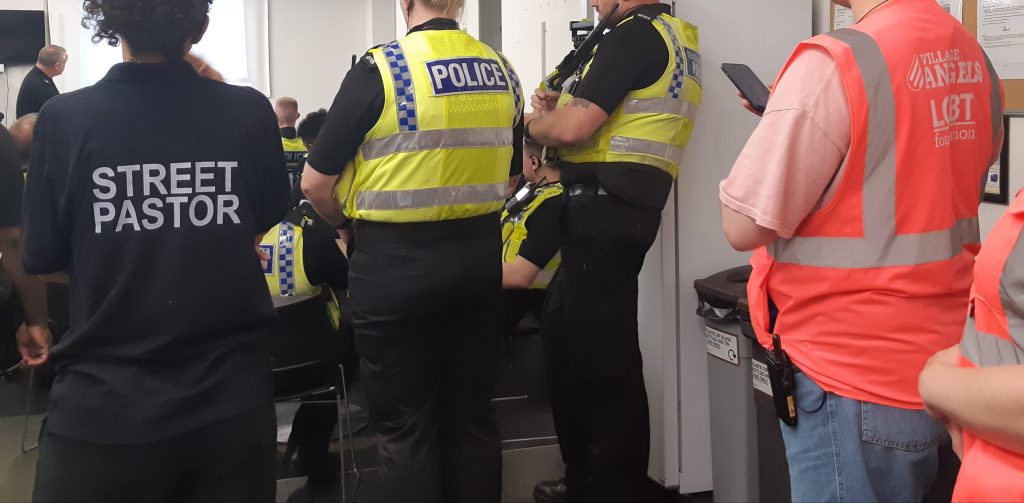
Historically and in the present day, there is often distrust between LGBT+ people and the police, so the Angels will offer to come with people to report crimes to help them feel safer doing so.
The second shift lead, Jimmy, said: “If it is a police matter, sometimes we’ll get people disclosing to us that a crime has happened to them and then they feel a lot more comfortable reporting that to the police with us there with them.”
The LGBT Foundation and their Village Angels are a vital part of Manchester’s queer community. This close relationship fosters trust between the charity and service users meaning people are more comfortable asking for support.
Gareth said: “The Village is such a massive queer space, and it’s such a massive part of our community – and there’s something kind of beautiful about the community protecting the community like that.
“Because of all the horrible, horrible things in the world, it’s extra important that people feel safe on Canal Street, because that is a place where they should feel safe to be completely themselves.
“I’ve never worked alongside people who are so, so incredibly passionate about what they do, who give up their Friday and Saturday nights to support strangers in their community, and it’s something I’m so happy to be a part of.”
Photos by Eleanor Taylor
